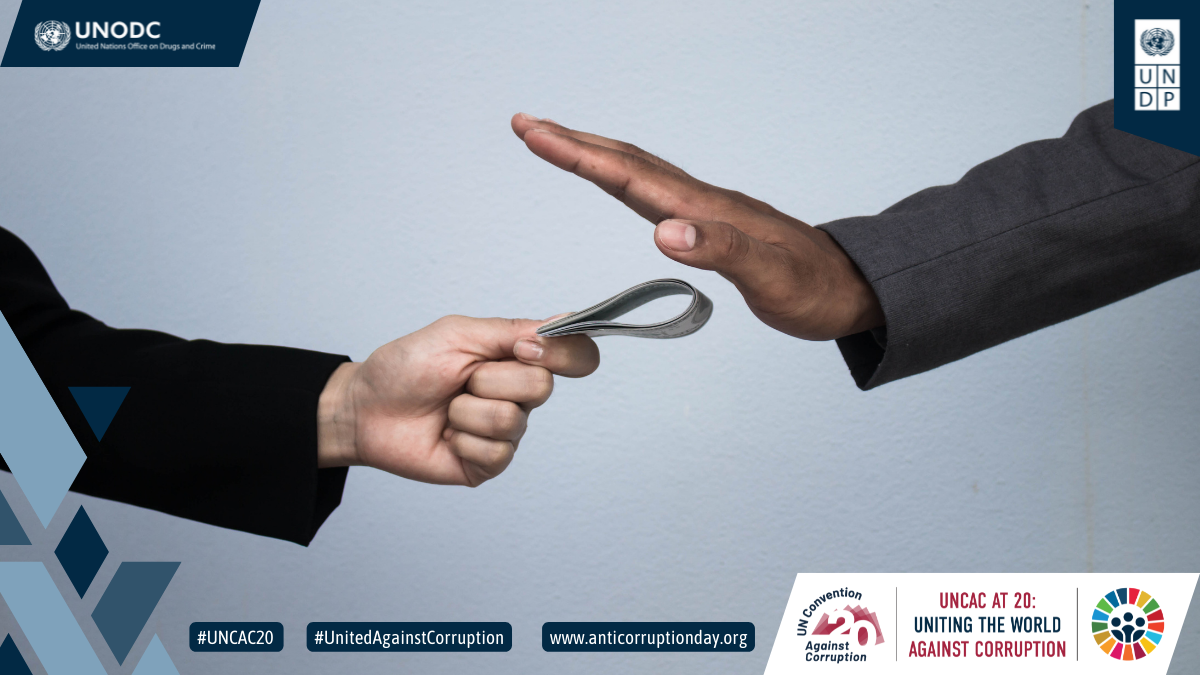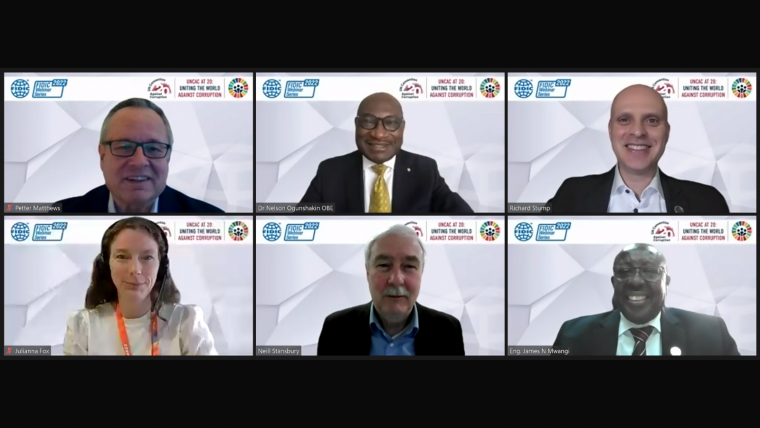The latest event in FIDIC’s webinar series took place on 9 December 2022 and was a special event to coincide with the UN’s International Anti-Corruption Day, which also launched the latest FIDIC State of the World report on the all-important issue of corruption.
The webinar, Working together to combat corruption in the global construction industry, was organised by the FIDIC integrity management committee and the knowledgeable panel of speakers focused on the key issue of corruption, crucially how to combat it and examines how stakeholders across the global construction and infrastructure industry can collaborate better to defeat this global scourge.
Welcoming attendees to the webinar, FIDIC board member James Mwangi said: “One of FIDIC’s key values is that of transparency and integrity and so it is highly appropriate that we are organising this webinar to coincide with the UN’s International Anti-corruption Day which takes place today. The day is organised every year to raise awareness of corruption and of the role of the UN convention in combating and preventing it.
“The global cost of corruption has been estimated at up to $4 trillion a year, a massive amount which FIDIC condemns in absolute terms. But it is not enough just to condemn corruption, we also need to do all we can to combat it and root it out. Corruption leads to a lack of trust and failed projects and this damages the construction industry – and indeed society - as a whole. FIDIC’s core values of Quality, Integrity and Sustainability offers a key platform in galvanising the industry to work together to increase the transparency of infrastructure delivery.”
Speakers at the webinar, which was chaired by FIDIC CEO Dr Nelson Ogunshakin OBE, included Richard Stump, vice president, RS&H and chair of the FIDIC integrity management committee, Julianna Fox, chief ethics and compliance officer at WSP Global, Petter Matthews, executive director, Infrastructure Transparency Initiative (CoST) and Engineers Against Poverty and Neill Stansbury, co-founder and director at the Global Infrastructure Anti-Corruption Centre.
The first panellist, Richard Stump, vice president, RS&H and chair of the FIDIC integrity management committee, who highlighted the key importance of integrity as one of FIDIC’s core FIDIC values. Stump briefly described some of the work of his committee and the five-pronged approach it takes. This was through policy, training, using tools like FIDIC’s FIMS, communications around what the committee does and also liaison with other relevant oprganisations and agencies to advocate for integrity and anti-corruption.
Stump went on to introduce some of the key findings of the new FIDIC State of the World report on corruption. He highlighted four key commitments from FIDIC to help the global construction industry tackle and address corruption. He said that FIDIC will work with organisations such as Transparency International, MDBs and via its communications platforms to monitor and provide updates on the analysis the report has highlighted.
FIDIC will also ensure that its tools to help the sector reduce corruption continue to adapt and become more sophisticated to identify corruption in its many forms. Stump also said that FIDIC wanted to use the UN’s annual International Anti-Corruption Day as a meaningful check-in point to review key activities, successes and challenges rather than simply an annual recognition that something needs to be done to prevent corruption.
Finally, Stump said that FIDIC was determined to bring anti-corruption to the attention of global leaders through initiatives like its Global Leadership Forum grouping and by exploring holding an annual Anti-Corruption Summit to bring key stakeholders together across the engineering, construction and infrastructure industry.
The next speaker Julianna Fox, chief ethics and compliance officer at WSP Global, said: “We should be proud that we work in an industry that takes the issue of corruption seriously and that is taking action to address it.” Notwithstanding this, Fox said there was no room for complacency as there was still a perception amongst some in the industry that the problem was getting worse. “The industry is in a very interesting moment as, post-pandemic, there is a lot of investment in infrastructure going on – and over a very short timeline, thereby potentially increasing corruption risks,” she said.
Fox highlighted the findings in FIDIC’s State of the World report that stated that the costs of not reducing corruption were very high – monetarily, socially and climatically. “We need to talk about the increasing risks that we face and also the increasing efforts being made to combat corruption,” said Fox. These efforts included better and more effective training, stronger due diligence when dealing with partners and also support for ‘whistleblowing’ in organisations, she said.
The next speaker Petter Matthews, executive director, Infrastructure Transparency Initiative (CoST) and Engineers Against Poverty, also praised the new FIDIC report. “FIDIC’s State of the World report makes a compelling case for acting more decisively on corruption and for doing it now,” he said. “Its message could not be more timely or more urgent. That’s because a failure to act will undermine our efforts to meet the pressing global challenges that we face,” said Matthews. He also highlighted the emerging ‘InfraTech’ agenda and said that it was essential that anti-corruption efforts are fully integrated into this agenda.
Final panellist Neill Stansbury, co-founder and director at the Global Infrastructure Anti-Corruption Centre, also added his congratulations to FIDIC for producing its report on corruption, which he said was part of the growing progress that was being made industry-wide in the fight against corruption. Stansbury also praised the work of anti-corruption campaigners and NGOs for raising awareness of the issues and giving people the confidence to take action.
The webinar discussion raised a number of issues from attendees on a range of issues including feeling comfortable in a “bad practice” environment, how best to guard against complacency, whether the reason behind continuation of corruption in some developing countries was the large interest rates on international loans and who should be the primary stakeholders in combating corruption.
Summing up the event, all the speakers highlighted the key role that FIDIC has to play in the global fight against infrastructure corruption. The recent State of the World corruption report makes it clear that FIDIC understands its powerful role and also the potential it has to organise collective action and industry collaboration to tackle the issue on a global scale.
The final event in FIDIC’s 2022 webinar series is a webinar organised by the FIDIC international financial institutions committee on Mitigating the impact of working in disaster and conflict zones which takes place on Tuesday 13 December at 12 noon CET. Please register your place as soon as possible to secure your place at this free event.
Click below to view a recording of this webinar.








